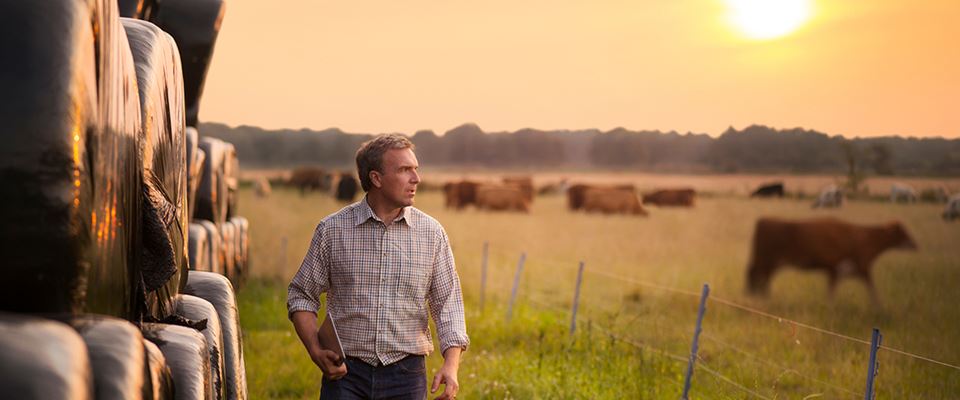It has been four years in the pipeline, but the new EU regulations banning the routine prophylactic use of antibiotics in farming have now come into effect – a move that includes an import ban on meat, dairy, fish and eggs produced using antibiotic growth promoters.1
For now, the new rules are likely to be felt most keenly by UK pig and poultry farmers, who may need to navigate new EU import tests – though it seems likely that the UK will develop similar regulations in future, which would clearly affect even those farmers supplying domestic markets.1
The need to reduce antibiotic use in farming is driven by the continuing emergence of antibiotic resistant pathogens like MRSA. Some estimates suggest that two thirds of all antibiotics are used on livestock animals, and there is strong evidence to suggest that this has contributed significantly to the problem of antibiotic-resistant bacteria.1
In 2019 antibiotic resistance was directly responsible for the deaths of more than one and a quarter million people worldwide and linked with the deaths of nearly five million people.1
If the UK follows suit, the need to adapt to new rules may be more widespread. However, it is worth noting that the UK already has an excellent track record for reducing antibiotic use through voluntary programmes particularly those overseen by RUMA (The Responsible Use of Medicines in Agriculture Alliance). Similarly, an annual review of antibiotic use is already a membership condition of the Red Tractor Assurance Scheme.3
Overall, in the livestock and dairy sectors, antibiotics use has dropped by 52% since 2014, while the use of antibiotics important to human health has fallen by 80% over the same period. Those improvements mean that the UK farms are already some of the lowest users of antibiotics across Europe.3 Though still using 2.5 times more than farmers in Denmark and the Netherlands, and over six times more than in Sweden.4
Anecdotally, one of the main issues with port of entry testing may flow from the fact that exports commonly include animals from multiple farms, all of which would be at risk of destruction if livestock from a single farm failed antibiotic testing.
A great place to start is by familiarising yourself with RUMA’s guidelines on the responsible use of antibiotics in farming, contacting the NFU for advice or getting involved in the Red Tractor Assurance Scheme.
For now, the new rules are likely to be felt most keenly by UK pig and poultry farmers, who may need to navigate new EU import tests – though it seems likely that the UK will develop similar regulations in future, which would clearly affect even those farmers supplying domestic markets.1
Antibiotics in farming: What is changing and why?
In simple terms the new EU regulations ban antibiotic use in two contexts. First, they outlaw the routine application of prophylactic antibiotics to groups of animals - a preventative use, which can be linked to poor welfare standards. Secondly, they ban the use of antibiotics to promote faster growth in livestock. Meanwhile, though the UK government has said it intends to introduce similar measures, it is yet to do so.1The need to reduce antibiotic use in farming is driven by the continuing emergence of antibiotic resistant pathogens like MRSA. Some estimates suggest that two thirds of all antibiotics are used on livestock animals, and there is strong evidence to suggest that this has contributed significantly to the problem of antibiotic-resistant bacteria.1
In 2019 antibiotic resistance was directly responsible for the deaths of more than one and a quarter million people worldwide and linked with the deaths of nearly five million people.1
What does an antibiotic ban mean for UK farmers?
Whether these new regulations will have an immediate impact on UK farmers will largely depend on whether they export to EU countries. France, for instance, has already passed the rules into national law.2If the UK follows suit, the need to adapt to new rules may be more widespread. However, it is worth noting that the UK already has an excellent track record for reducing antibiotic use through voluntary programmes particularly those overseen by RUMA (The Responsible Use of Medicines in Agriculture Alliance). Similarly, an annual review of antibiotic use is already a membership condition of the Red Tractor Assurance Scheme.3
Overall, in the livestock and dairy sectors, antibiotics use has dropped by 52% since 2014, while the use of antibiotics important to human health has fallen by 80% over the same period. Those improvements mean that the UK farms are already some of the lowest users of antibiotics across Europe.3 Though still using 2.5 times more than farmers in Denmark and the Netherlands, and over six times more than in Sweden.4
What about exports to the EU?
This is the area where the ban on antibiotics may be felt the most. Though it remains to be seen how the ban on imports will be enforced, testing for over-use of antibiotics at ports of entry seems likely, which will mean more complexity and cost for producers already struggling with exports following Brexit.5Anecdotally, one of the main issues with port of entry testing may flow from the fact that exports commonly include animals from multiple farms, all of which would be at risk of destruction if livestock from a single farm failed antibiotic testing.
Antibiotics in farming: Be prepared
The risks that farmers may face as a result of this new EU regulation, and any UK legislation that follows, is not something that can be insured against, so preparation is vital.A great place to start is by familiarising yourself with RUMA’s guidelines on the responsible use of antibiotics in farming, contacting the NFU for advice or getting involved in the Red Tractor Assurance Scheme.
Here to help
In the meantime, our team of farming risk and insurance specialists is on hand to help – so get in touch if you need confidential advice and support.
Sources:
- ciwf.org.uk ‘UK falls behind the EU on farm antibiotic standards’
- thepoultrysite.com ‘France bans meat imports from animals treated with growth antibiotics’
- fwi.co.uk ‘EU antibiotics policy change sparks debate’
- saveourantibiotics.org briefing ‘UK falls behind EU on farm antibiotic rules’
- theguardian.com ‘Brexit: food and drink exports to EU suffer disastrous decline’











